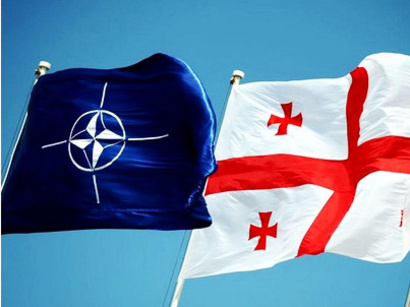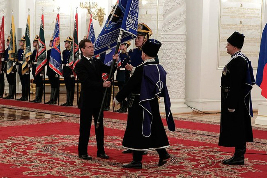Vladimir Putin Visits Baku
By Mina Muradova (the 04/09/2013 issue of the CACI Analyst)
In mid-August, Russia’s President Vladimir Putin paid his first visit to Baku after resuming his presidency. No significant political declarations were made, but observers considered the visit to be a gesture aimed at dismissing speculations that the Kremlin is supporting an opposition candidate with Russian citizenship in Azerbaijan’s presidential elections, scheduled for October. The visit was intended to demonstrate that bilateral relations between the two countries are developing, even in the face of recent setbacks.
Russia Pressures Armenia to Join Customs Union
by Stephen Blank (the 08/21/13 issue of the CACI Analyst)
The centerpiece of current Russian foreign policy is integrating as many post-Soviet states as possible in what will ultimately be a Eurasian Economic Union (EEU). The first step of this process is to join a Customs Union and Russia is bringing enormous pressure to bear upon Kyrgyzstan, Tajikistan, Ukraine, and now Armenia to join. It is being made clear to these states that if they join the EEU or what Moscow calls EURASEC, they will not be able to join other trade organizations, e.g. those inherent in the EU’s Eastern Partnership. While most publicity has focused on Ukraine, recent Russian policy towards Armenia is no less revealing of Moscow’s tactics and goals.

Georgia's NATO Membership Will Bring Regional Stability
by Mamuka Tsereteli (the 08/07/2013 issue of the CACI Analyst)
The North Atlantic Treaty Organization (NATO) is the only reliable security umbrella for the Georgian state. Georgia made the political decision to join NATO in 2002. At the Bucharest Summit in 2008 NATO promised Georgia membership, and since 2011 allies refer to Georgia as an aspirant partner country. But Russia opposes Georgia’s NATO membership and some Western European countries see Georgia’s membership as a source of potential conflict with Russia. The alliance needs to provide real mechanisms for membership to Georgia that could bring much needed stability to the entire Caucasus region.

Cossacks In North Caucasus Demand Increased Support from Moscow
by Valeriy Dzutsev (the 08/07/2013 issue of the CACI Analyst)
Terek Cossacks in the North Caucasus have laid out surprisingly bold claims to the authorities in Moscow, attempting to carve out large chunks of property and resources in the region. The Cossacks’ outburst clashes with the interests of North Caucasians and contribute to the rising tensions between ethnic Russians and ethnic North Caucasians. While Moscow and regional authorities in the ethnic Russian-majority provinces have repeatedly played the Cossack card against the North Caucasians, the government also apparently loathes giving the Cossacks excessive prominence, fearing they might eventually grow into an independent force and challenge the central government.

Shah Deniz Consortium Opts For Westward Gas Exports Through Trans-Adriatic Pipeline
by Mina Muradova (07/10/2013 issue of the CACI Analyst)
The Shah Deniz consortium has announced its selection of the Trans Adriatic Pipeline (TAP) as the route for transporting gas from the Caspian Sea to Europe. The choice of TAP over the rival pipeline Nabucco West determines a route that will be used to diversify gas supplies to the European market in order to reduce European dependence on Russian gas.








 Book S. Frederick Starr and Svante E. Cornell,
Book S. Frederick Starr and Svante E. Cornell,